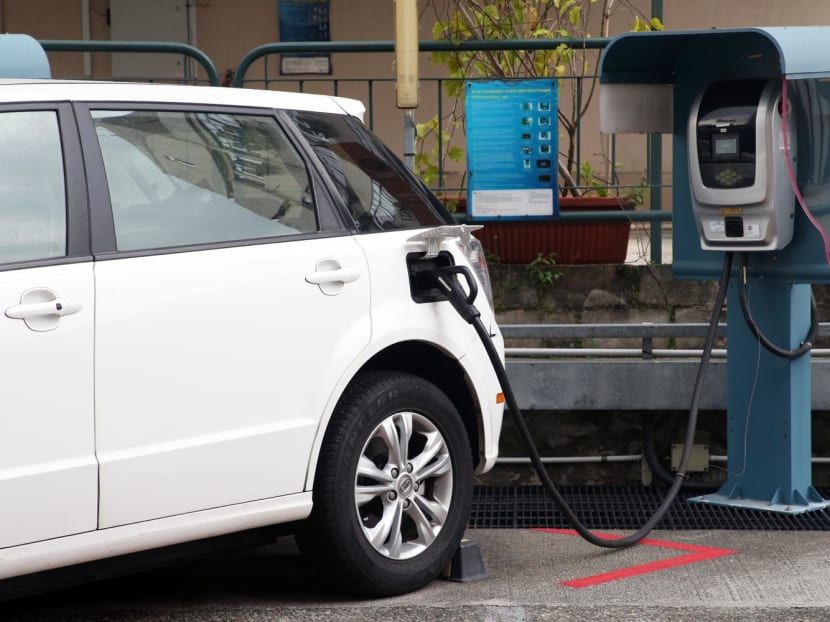Bill proposes that all new buildings must install 1 EV charger for every 25 parking lots
SINGAPORE — All new buildings with car parks must install a minimum number of electric vehicle (EV) charging points, equivalent to around one for every 25 parking lots, under a proposal tabled in Parliament on Wednesday (Nov 9).

- The Electric Vehicles (EV) Charging Bill, if passed, will set out rules and regulations governing the charging of EVs
- All new buildings will have to install a minimum number of charging points, equivalent to about one for every 25 parking lots
- Management corporations of strata-titled developments will be able to pass EV-related resolutions with a lower vote threshold
SINGAPORE — All new buildings with car parks must install a minimum number of electric vehicle (EV) charging points, equivalent to around one for every 25 parking lots, under a proposal tabled in Parliament on Wednesday (Nov 9).
The Electric Vehicles Charging Bill, if passed, will regulate the safe charging of EVs, ensure reliable charging services are available and expand the network of accessible charging infrastructure in Singapore.
“This is in line with our target to deploy 60,000 charging points by 2030, and for all vehicles to be of cleaner energy by 2040,” the Land Transport Authority (LTA) said in a statement.
The move comes amid rapidly growing EV adoption here, with new electric car registrations forming 8.4 per cent of all new car registrations in the first five months of the year, more than twice the rate in 2021 and over 20 times that in 2020.
The Bill will require EV chargers to be provided if the development’s building and electrical works fall under these two categories:
- Building works that erect or re-erect new buildings, or carry out works that increase the gross floor area of a development by at least 50 per cent, and
- Electrical works that result in an increase of the approved electrical load to more than 280 kilo-volt ampere (kVA)
If the Bill is passed, subsidiary legislation will be tabled to require the development to supply sufficient power capacity of at least 1.3kVA for every car and motorcycle parking lot, LTA said.
That is equivalent to being able to support 7.4kW charging points with smart charging capability — around the average charging power of many chargers found in shopping centres and homes — for about one in five lots, it added.
The development will, however, only need to install a minimum number of charging points that draw on a combined power of at least one-fifth of the mandated 1.3kVA power capacity — equivalent to about one 7.4kW smart charging point for every 25 lots.
Having more power capacity than needed would allow more charging points in the future, if necessary.
Developments with fewer than eight parking lots will be exempted from having to install a minimum number of charging points.
LTA added that amendments will be made to existing laws so that management corporations (MCSTs) of strata-titled developments will be able to pass resolutions for certain proposals to install or uninstall EV chargers with a lower threshold of more than 50 per cent of the votes at a general meeting.
The current threshold for MCSTs to pass EV-related resolutions is 90 per cent.
Any proposals to enact by-laws on the use of parking lots for EV charging, such as designating charging lots to be used only by EVs, will also only require a simple majority of votes.
CERTIFICATION REQUIRED FOR EV CHARGERS; EV CHARGING BUSINESSES TO BE LICENSED
All EV chargers in Singapore, including those installed on private property, will need to be installed, certified and used according to prescribed standards.
They will also have to be registered and inspected regularly to ensure they conform to standards.
Businesses that provide EV charging services, such as renting out chargers or providing battery swapping services, will have to obtain a licence before providing such services.
They will have to comply with data sharing conditions, buy public liability insurance and ensure their chargers meet service standards.
The Bill will also provide a transition period for the industry and the public to comply with the new rules.
Upon the Bill’s commencement, existing suppliers can continue to supply non-approved EV chargers for six months.
Existing EV chargers that are not registered can continue to be used for six months and EV charging operators can carry on with their operations without a licence for 12 months.
In response to queries by TODAY, LTA said that the proposed Bill sets out a range of offences in relation to the supply, installation, certification, registration and use of EV chargers and such penalties vary depending on the severity of the offence.
For example, an individual who knowingly or recklessly charges an EV with an unregistered charger would be liable upon conviction to a maximum fine of S$5,000 or imprisonment of no more than six months, or both.
In the case of a more severe offence, such as tampering with an EV charger so as to cause danger to persons and property, an individual would be liable upon conviction to a maximum fine of S$100,000 or imprisonment of no more than five years, or to both.
CLARIFICATION: In an earlier version of this report, it was stated that under the Bill, all new buildings including Housing and Development Board (HDB) blocks must install one electric vehicle charger for every 25 parking lots. The Land Transport Authority has clarified that HDB blocks are not covered under the Bill.











